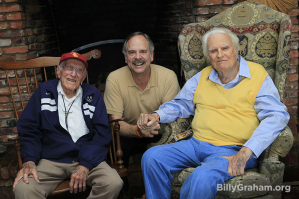
Angelina Jolie's latest film "Unbroken" is set to hit U.S. theaters on Christmas Day. While the movie tells the detailed story of former Olympian and World War II veteran Louis Zamperini, his remarkable life could not fit within its limited time frame.
Zamperini, who became a Christian after visiting a Los Angeles Billy Graham crusade in 1949, had been broken down by memories of anger, fear and alcoholism. In an opinion article posted on Fox News, Franklin Graham, the son of the legendary American pastor, attempted to cover the rest of the story not portrayed in the upcoming film.
"Returning to life in California after World War II revealed what the Japanese couldn't do to Louie Zamperini," Graham wrote. "They couldn't break this hero. But Louie's real battle was still ahead."
According to Graham, Zamperini enjoyed the celebrity status of being a hero, hanged out with Hollywood stars, and later married Cynthia Applewhite. But reality started to come home to him.
"His wife, who genuinely loved him, felt she had no choice but to divorce him," Graham wrote. The man who had endured horrific physical and mental abuse, and emerged unbroken from the ravages of war, had succumbed to an enemy that would not let go -- himself."
Graham noted that while Zamperini was being tormented by the nightmares of war, his father placed a 480-foot tent in a Los Angeles parking lot as part of a three-week evangelism campaign. It ended up lasting eight weeks because of the massive response.
While Zamperini was initially skeptical and hesitant to visit the crusade, he eventually went after his wife, who became a Christian, promised him that they would leave after the "every head bowed and every eye closed" invitation made by Billy Graham.
"When the invitation came, he recalled the broken promise he had made to God as he was kept alive while drifting on the Pacific, 'If you will save me, I will serve you forever,'" Graham wrote.
Zamperini later went toward the direction of Billy Graham and gave his life to Jesus Christ.
"It was this life-changing moment that blotted out the nightmares and years of torment," Graham wrote. "Louie Zamperini is an example of a life that changed instantly."
Graham added that after Zamperini left the crusade, he dumped his liquor down the drain and placed his "girlie magazines" and cigarettes in the trash. He then started reading a Bible originally issued by the air corps.
"For the first time God's Word began to make sense to him," Graham wrote. "This former prisoner of war had discovered the joy of freedom found in Christ and desired to pass it on to others."
According to Graham, Zamperini did this by establishing the Victory Boys Camp to help out troubled boys and enable them "to live productive lives."
As for the film itself, Cal Thomas of World News Group thought the story as described by Franklin Graham should have been included in there. He found it "puzzling" as to why Jolie would leave that part of the story out.
"In media appearances, Jolie has refused to discuss why the most remarkable part of Zamperini's story was excluded from the film," Thomas wrote. "That would be the night he was converted at the 1949 Billy Graham crusade in Los Angeles."
Thomas added that Jolie's omission of Zamperini's conversion could hurt "Unbroken" at the box office, noting that "many who share Zamperini's faith may not buy tickets."
In Jolie's defense, Luke Zamperini said that his father's life as portrayed on screen had his personal approval. In addition, Luke said that his father wanted to intentionally relay the story that way.
"UNBROKEN tells my Dad's story the way he told it: chronicling all he lived through so that what he did after becoming a Christian -forgiving his captors -would have the most resonance with audiences of all faiths, and no faith at all," Luke wrote.






